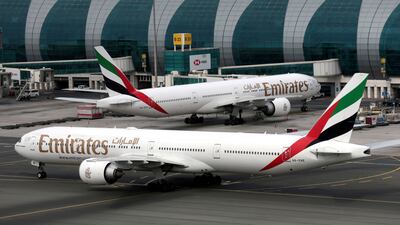Concerns over the spread of the Omicron variant of Covid-19 have led Emirates airline to place restrictions on flights from a number of African countries.
Bans initially covered southern African nations, following a decree from the UAE government in November preventing travellers from seven countries, including Eswatini, Lesotho, Botswana, Mozambique and Namibia, from entering the UAE.
Restrictions have since been expanded to cover destinations across the continent, including the Republic of Congo, Kenya and Tanzania.
On December 28, Emirates announced restrictions on inbound flights from Conakry, Guinea and Luanda, Angola. Passengers starting their journey from Conakry and flying via Dakar, Senegal, will also not be accepted for travel. Casablanca, Morocco was added to the list on January 5.
Which countries are affected?
Restrictions apply to inbound passengers only, including anyone who has visited or transited through these destinations in the 14 days prior to travel to the UAE. Outbound passenger operations remain unaffected.
Emirates has currently banned travellers from the following countries, until further notice:
Angola, effective December 28
Guinea, effective December 28
Uganda, effective December 28
Ghana, effective December 28
Ivory Coast, effective December 28
Kenya, effective December 25
Tanzania, effective December 25
Ethiopia, effective December 25
Nigeria, effective December 13
Zambia, effective November 27
Zimbabwe, effective November 29
South Africa, effective November 29
Morocco, effective January 5
How to proceed if you're travelling from one of these countries
Passengers who have already booked flights from these destinations do not need to contact the airline. “Affected customers do not need to call us immediately for rebooking,” Emirates advises on its website.
“Customers can simply hold on to their Emirates ticket and, when flights resume, get in touch with their travel agent or booking office to make new travel plans.”
What are the exemptions?
UAE citizens, their first-degree relatives, diplomatic missions, official delegations between the UAE and these countries, and golden visa holders are exempt from restrictions and can fly in from these countries.
These travellers should present a negative Covid-19 test obtained within 48 hours of departure and a Rapid-PCR test at the airport within six hours of departure wherever possible. Another PCR test will be required at the airport on arrival in the UAE.
A 10-day quarantine and a PCR test on the ninth day of entering the country is required for UAE citizens, their first-degree relatives, diplomatic missions and golden visa holders.
UAE citizens are barred from travelling to any of the listed countries in Africa except for emergency treatment cases, official delegations and scholarships.
White hydrogen: Naturally occurring hydrogen
Chromite: Hard, metallic mineral containing iron oxide and chromium oxide
Ultramafic rocks: Dark-coloured rocks rich in magnesium or iron with very low silica content
Ophiolite: A section of the earth’s crust, which is oceanic in nature that has since been uplifted and exposed on land
Olivine: A commonly occurring magnesium iron silicate mineral that derives its name for its olive-green yellow-green colour
Landfill in numbers
• Landfill gas is composed of 50 per cent methane
• Methane is 28 times more harmful than Co2 in terms of global warming
• 11 million total tonnes of waste are being generated annually in Abu Dhabi
• 18,000 tonnes per year of hazardous and medical waste is produced in Abu Dhabi emirate per year
• 20,000 litres of cooking oil produced in Abu Dhabi’s cafeterias and restaurants every day is thrown away
• 50 per cent of Abu Dhabi’s waste is from construction and demolition
UAE currency: the story behind the money in your pockets
MATCH INFO
Barcelona 4 (Suarez 27', Vidal 32', Dembele 35', Messi 78')
Sevilla 0
Red cards: Ronald Araujo, Ousmane Dembele (Barcelona)
Crops that could be introduced to the UAE
1: Quinoa
2. Bathua
3. Amaranth
4. Pearl and finger millet
5. Sorghum
Profile of VoucherSkout
Date of launch: November 2016
Founder: David Tobias
Based: Jumeirah Lake Towers
Sector: Technology
Size: 18 employees
Stage: Embarking on a Series A round to raise $5 million in the first quarter of 2019 with a 20 per cent stake
Investors: Seed round was self-funded with “millions of dollars”
What sanctions would be reimposed?
Under ‘snapback’, measures imposed on Iran by the UN Security Council in six resolutions would be restored, including:
- An arms embargo
- A ban on uranium enrichment and reprocessing
- A ban on launches and other activities with ballistic missiles capable of delivering nuclear weapons, as well as ballistic missile technology transfer and technical assistance
- A targeted global asset freeze and travel ban on Iranian individuals and entities
- Authorisation for countries to inspect Iran Air Cargo and Islamic Republic of Iran Shipping Lines cargoes for banned goods
Some of Darwish's last words
"They see their tomorrows slipping out of their reach. And though it seems to them that everything outside this reality is heaven, yet they do not want to go to that heaven. They stay, because they are afflicted with hope." - Mahmoud Darwish, to attendees of the Palestine Festival of Literature, 2008
His life in brief: Born in a village near Galilee, he lived in exile for most of his life and started writing poetry after high school. He was arrested several times by Israel for what were deemed to be inciteful poems. Most of his work focused on the love and yearning for his homeland, and he was regarded the Palestinian poet of resistance. Over the course of his life, he published more than 30 poetry collections and books of prose, with his work translated into more than 20 languages. Many of his poems were set to music by Arab composers, most significantly Marcel Khalife. Darwish died on August 9, 2008 after undergoing heart surgery in the United States. He was later buried in Ramallah where a shrine was erected in his honour.


